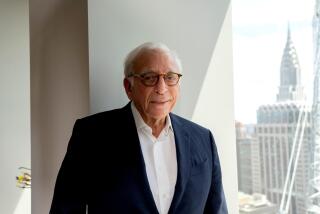CEO May Not Be Best Outside Director Choice
- Share via
There’s a disease rampant in American corporations, and it’s called chief executive overload. Unfortunately for the quality of the management in many companies, it’s not an overload of work at the company. Rather, it’s an overabundance of activities outside. It often raises the question of who’s minding the store.
The fact is, put CEO behind someone’s name and there’s a feeling that it confers superhuman talents, an ability to be intimately involved in a dozen organizations at once.
It doesn’t always work that way.
Take the former chief executive of a major Midwest electronics company. Apparently driven by an insatiable need for ego gratification, he served as a director of more than half a dozen other companies and was a leader in community groups as well. There was just one problem: The company he worked for needed more of his time than it was getting. When results got so bad it omitted its dividend, the CEO was forced to leave.
Ego isn’t always the problem. There’s a strong tendency among companies and community groups alike to be attracted by titles and prestigious names. As a result, too many organizations are chasing too few people to serve as directors or to chair money-raising drives. Most of them believe that getting a big name or a big title will mean more to them than enlisting the aid of someone with adequate time to spare.
Need Careful Oversight
The question is whether all of this overload is really necessary. Major corporations that insist on salting their boards with the CEOs of other major corporations may not be getting what their shareholders most need: careful oversight of what management is doing.
True, the presence of the other CEOs may serve as something of a network for a big company, helping it to develop business contacts or obtain financing. But there’s another kind of networking at work as well. It serves the desire of management to get outsiders on the board with a similarity of background and not likely to make trouble. Not all CEOs fall into that category, of course, but, with the typical CEO serving on four or five boards, there’s good reason to doubt the ability to keep close track of what’s going on.
The overuse of CEOs is insidious in another way. Since few women and minorities have reached CEO status, it restricts the number of them involved in corporate vigilance. “I think we need to constantly widen the circle to bring in people with fresh perspective, people more likely to question management,” argues Kia Lindholst, who directs North American operations for Egon Zehnder International, a top executive search firm.
Lindholst sees some improvement. As a result of situations such as the one he cited at the Midwest electronics company, many boards are discouraging their CEO from accepting other directorships. Moreover, the threat of costly liability suits has made directors more aware of their exposure if they don’t perform diligently. That’s influencing some CEOs to forgo serving on any outside boards and, in turn, making it tougher on companies to restrict their search to such a small group.
Much Untapped Talent
Reaching lower into the ranks of top executives has its advantages. A metals company that needed someone strong in strategic planning, for example, decided to trade high visibility in a new board member for one who was strong in that discipline. “There’s certainly a wealth of untapped talent in management below the CEO level,” Lindholst says.
One problem, however, is that for all of their willingness to accept outside duties, CEOs often discourage the people under them from diverting their attention in that manner. It’s a pity, because experience serving on another board might well help prepare second-level managers for the top office.
The quest by charitable and other community groups for big names to serve as volunteer chairpersons and trustees is another part of the problem.
“I think you’ll find that the community tends to exploit some of us; people who are willing to serve are on everybody’s list,” says Richard Ferry, president of the executive search firm of Korn Ferry International. Ferry says he feels a strong obligation to serve, but he’s stepped aside from a couple of outside groups because he found himself overscheduled.
More to Read
Inside the business of entertainment
The Wide Shot brings you news, analysis and insights on everything from streaming wars to production — and what it all means for the future.
You may occasionally receive promotional content from the Los Angeles Times.









